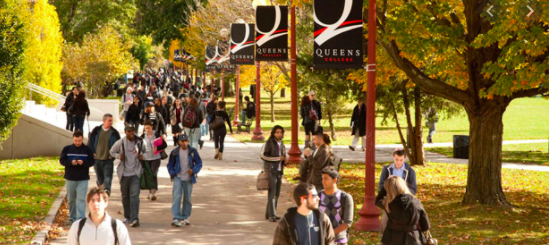The Graduate Center provides services for, among others, QC graduate students, who find themselves without a representative in the Senate.
The Queens College Student Senate is the legislative branch of the Student Association. As outlined on its website, its primary responsibilities are to “consider such bills and resolutions as may concern the general welfare of the Queens College student body and moderate the actions of the Executive Branch.”
By this measure, there’s a glaring problem in the Student Senate: the inadequate representation of Queens College’s graduate students.
Of the 20 students that comprise the Senate, only one is involved in graduate study. Without the contributions of someone with a thorough understanding of their experiences, the needs of several thousands of graduate students attending Queens College often go unaddressed.
It is a problem that the Chair of the Student Senate, Siddharth Malviya, readily acknowledges. Regarding the conspicuous lack of graduate senators, Malviya explains, “It’s the Senate’s purview to declare standing committees each year at its first meeting. The constitution [of the Student Association] outlines in Article VIII, Section 9, item 7, that a Graduate Students Committee may be declared. However, I have yet to see it be declared.”
Malviya believes that the delay may have something to do with the position of committee chair being too great a commitment for anyone as busy as the average graduate student to take on. He notes: “Graduate students tend to be fully immersed in their field of study. Finding one to chair the committee is difficult, as the chair for that committee is tasked with organizing graduate students and representing them accordingly.”
It’s not as though graduate students haven’t been involved in the politics of the student government in the past. Jay Hershenson, Queens College alumnus, Class of 1976, and Senior Advisor to the President, strongly remembers the previous advocacy groups formed on behalf of Queens’ graduate student body.
“In the 1970s, there were several student government associations at Queens College, including a Graduate Student Association. The president was Michael Gilman,” Hershenson said.
The Graduate Student Association was one of many similar organizations, such as the Adult and Continuing Education Association, which addressed the needs of a particular group of students. Over time, these separate organizations became a conglomerate organization – what is known today as the Student Association. Members of the Academic Senate were taken from there to become the Student Senate.
“According to Academic Senate Parliamentarian Dave Fields, there were five seats set aside for graduate student representation,” Hershenson said. “Over time, for many years, there were no candidates who expressed interest in running for those seats. The student seats were vacant. So instead of setting aside five designated seats, graduate students were encouraged to run for Senate at-large seats.”
The seats were eliminated in response to what was assumed to be graduate students’ waning interest in participation. Going by Chair Malviya’s observations, though, the more likely cause may have been an inability to participate due to time constraints.
Nevertheless, graduate students’ lack of participation in the Senate should not preclude their consideration during Senate proceedings. Whether a liaison is appointed to speak on their behalf or graduate advisors appear before the Senate with their observations, it is paramount that graduate students receive the same audience for their concerns afforded their undergraduate peers at Queens College.














